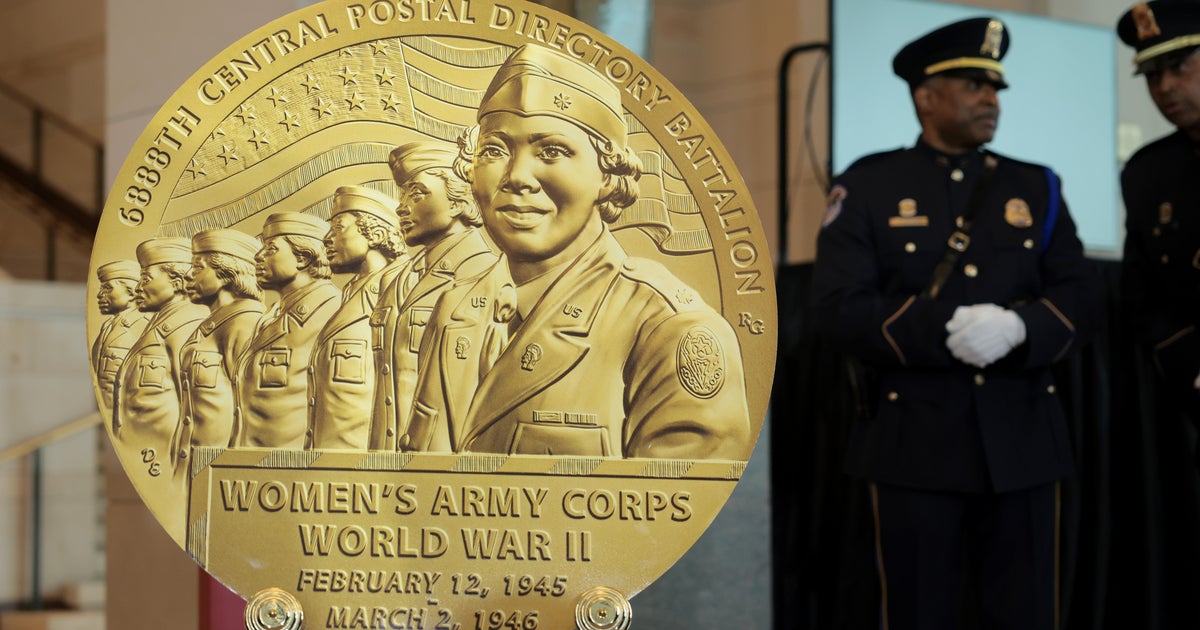In a profoundly poignant moment in history, an exclusively all-Black, all-female World War II unit, widely celebrated as pioneers in a journey for recognition and equality, was awarded the Congressional Gold Medal. The illustrious ceremony, held on a remarkable Tuesday in the esteemed Emancipation Hall at the U.S. Capitol building, honored these women for their indispensable service during a time of grave international conflict. Their duty not only advanced the effectiveness of wartime communication but also offered a critical morale boost to the frontline soldiers anxiously awaiting news from home.
The battalion, formally known as the 6888th Central Postal Directory Battalion but affectionately referred to as “The Six Triple Eight,” was distinguished by the United States Congress through bipartisan legislation in 2022, for their unprecedented work in managing military mail during World War II. House Speaker Mike Johnson, hosting the ceremony, eloquently acknowledged their contribution, noting that “The entire Six Triple Eight are great American patriots, loyal to a nation that for far too long failed to return that favor.” His acknowledgment served as a stark reminder of the racial and gender inequalities that these brave women had to endure even as they served their country diligently.
The 6888th Central Postal Directory Battalion, under the driven leadership of Major Charity Adams Earley, achieved remarkable feats during their deployment in Europe. They tackled a daunting backlog of mail, which had piled up, unsorted, thus severely impacting the morale of soldiers on the frontlines. The task ahead of them was immense: the unit had to sort and process approximately 17 million pieces of backlogged mail. Against all odds and armed with the motto “no mail, low morale,” these women worked tirelessly in warehouses in England and France, successfully clearing the backlog in just three months, far exceeding the Army’s expectation of six months. Their meticulous work not only ensured that soldiers received letters from loved ones but also maintained morale and, in many cases, saved relationships across continents.
The impact of their work transcended the war and entered cultural and public acknowledgment much later, highlighted by the release of the movie “The Six Triple Eight,” directed by Tyler Perry and starring Kerry Washington as Commander Charity Adams Earley. This film brought the unit’s remarkable story and achievements to a broader audience, showcasing their struggle, resilience, and dedication.
Charity Adams Earley, who passed away in 2002, was represented by her son Stanley at the ceremony. In his emotional address, he underscored the significance of the Congressional Gold Medal in acknowledging the efforts of those previously marginalized. “The Congressional Gold Medal has reinforced the principle that those who dedicate themselves fully, regardless of race or gender, can be recognized at the highest levels, and above all, that excellence matters,” he asserted, reflecting on the posthumous recognition of his mother’s formidable leadership and the battalion’s service.
Unfortunately, the personal handover of medals to recipients of the Six Triple Eight had its bittersweet notes, as none of the two living veterans were present at the ceremony. Retired Colonel Edna Cummings, who spearheaded the advocacy for the battalion’s recognition, regretfully noted their absence but remained resolute in her tribute, celebrating their rightful listing among the prestigious few who have received the Congressional Gold Medal since it was first bestowed to General George Washington in 1776.
Amidst broader institutional and cultural challenges, including an ongoing scrutiny over content promoting diversity, equity, and inclusion by the Defense Department, the timing of this recognition held particular significance. Cummings, in her speech, poignantly remarked on the import of the day, “I am more than honored to be with you today to present the Six Triple Eight with our nation’s highest civilian award, the long-awaited, much-sought-after Congressional Gold Medal.”
Calls for ongoing remembrance and protection of the legacy of the Six Triple Eight were echoed in Stanley Earley’s concluding remarks. He stressed the need for continued acknowledgment and respect for the battalion’s accomplishments to ensure that future generations recognize and remember the significant strides made by these remarkable women toward racial and gender equality in the military.
The story of the 6888th Central Postal Directory Battalion is not just one of overcoming prodigious logistical challenges; it is also a profound narrative about breaking barriers, challenging the status quo, and setting a precedent for recognition and equality. The ceremony thus became a site of both historical remembrance and a beacon for ongoing advocacy for diversity and inclusion within the armed forces and beyond.
Eleanor Watson, a seasoned CBS News reporter who covers the Pentagon, has been pivotal in bringing such stories to the forefront, ensuring that the contributions of marginalized groups are acknowledged widely in public and historical discourses. Her coverage continues to illuminate the paths trodden by those who have historically been sidelined, thereby enriching our understanding of the multifaceted fabric of American military history.









